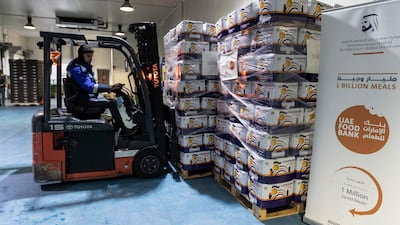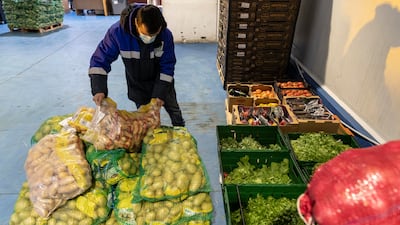A humanitarian drive by the UAE to distribute one million meals to the needy during Ramadan has led to 1.3 million already being delivered. Now, organisers now want to double the target to two million.
The One Million Saved Meals campaign by the UAE Food Bank was launched this month to reduce needless food waste and help vulnerable members of society.
A warehouse in Dubai’s industrial area of Ras Al Khor has been receiving more than 70,000 fruit and vegetables a day from dozens of hotels, retailers and fruit and vegetable markets.
These goods are then sent to charities and central kitchens that prepare and hand out packed meals and groceries to the underprivileged.
The campaign supports the work of the One Billion Meals campaign, which is providing food support to disadvantaged people in 50 countries during the holy month and beyond.
The goal is to deliver two million meals by the end of Ramadan, said Dr Issam Sharaf Al Hashmi from the UAE Food Bank.
“Our target was to deliver one million meals, but we’ve already reached 1.3 million. Now, we are targeting two million meals by the end of this month," he said.
“This is extra food from the market that would’ve been thrown into the landfill. We repurpose it for needy people and their families.”










Global statistics indicate that about 1.17 billion tonnes of food are wasted each year, with a total value of $1 trillion. A quarter of the food wasted annually can feed more than 870 million people.
The campaign is divided into four categories: the Goodness Kitchen Initiative; Hotel Ramadan Buffet Initiative; Ramadan Basket of Fruits and Vegetables; and the Ramadan Meer Initiative.
Fruit and vegetables are sent from the warehouse to a kitchen where cooks prepare meals such as biryani and chicken curry as part of the Goodness Kitchen Initiative.
Workers at the warehouse also pack gift baskets of fruit and vegetables that are sent to charities.
Basic foodstuff is collected from supermarkets and retail outlets and delivered to the UAE Food Bank’s warehouses. As part of the Ramadan Meer initiative, these are packed and distributed to beneficiaries across the country.
For the Hotel Ramadan Buffet Initiative, surplus food that is fit for consumption is collected from hotel iftar buffets.
The food is packed into meals and handed out at labour housing and to families with limited incomes.
There are food inspectors that work with the UAE Food Bank to ensure the meals being collected meet safety standards.
“We inspect all of the food before we distribute anything. Whenever we receive any calls from our partners that they have extra food, we will ask them to send this meal to our UAE Food Bank locations," Dr Al Hashmi said.
“We have inspectors that make sure the food meets all the safety requirements. Only then we call our charity partners to pick these meals up and deliver to the needy families.”

